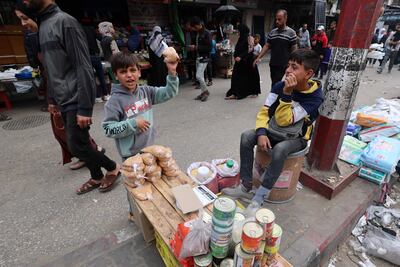Live updates: Follow the latest on Israel-Gaza
Markets in Gaza are filled with goods which mainly come from Israel after it took full control of Gaza's borders.
The bulk of produce available in the enclave comes with an Israeli label, angering Gazans who are forced to buy goods that many others around the world are boycotting.
“I am so surprised to find most of the goods are Israeli, not only that, but the prices are so high,” Ahmad Sarhan, a resident of Rafah told The National.
A trader in Tal Al Sultan said the closure of the Rafah border crossing “forced us to bring the Israeli goods” from the occupied West Bank and Israel.
“I am so sorry that we don’t have options in importing the goods, these goods or nothing. People don’t have the choice,” Ahmad Al Dairy, a fruit and vegetable trader, told The National.
The only land crossing open for commercial movement is the Karam Abu Salem crossing in the south of Gaza, where goods are now imported.
“We received goods this week from the Karam Abu Salem crossing. The process of bringing in the goods and selling them to Gaza traders is conducted between the Israeli authorities and a number of traders in Gaza chosen by the Israeli authorities,” Mr Al Dairy said.
Israeli forces seized the Gazan side of the Rafah crossing on May 7, preventing passengers and goods from entering the enclave.
Last week, the Palestinian Chambers of Commerce in Ramallah said that “the entry of food products from the West Bank and Israel is available to all traders after co-ordination through the shipping company associated with each importer”.
“There is no intervention or restriction from any Palestinian authority on the entry of any goods. There are no fees, customs duties, or surcharges on incoming goods,” it said.

Mr Al Dairy said that despite no fees on goods, prices are still higher than before the war began.
“Unfortunately, there are traders who monopolise some goods and control their prices, in addition to the Israeli merchants controlling the prices of goods by selling them at high prices,” Mr Al Dairy said.
Some Gazans called for a boycott of goods.
“We need to apply some pressure. We are not happy about spending our money on our enemy but at the very least, they should stop exploiting people’s needs and show some mercy towards us,” said Mohammed Foad, 40, who was displaced from Gaza city.
Mr Sarhan could not buy the goods he wanted due to the high prices.
“Where are we supposed to get the money from to buy the goods with these high prices?” he said.
“The war lasted for eight months, and we don’t work.”
He bought six eggs for ten Israeli Shekel ($2.70). Before the war, 50 eggs would cost around 14 Shekels ($3.81).
“I couldn’t buy the fruit despite wanting them … my son asked me to bring him watermelon so I bought a small slice only for him,” he said.
Mr Sarhan, a resident of Rafah, lost his house and all his savings in Israeli shelling ten days ago.
Mohammed Ahmad another Rafah resident lost his wife and several family members during the war. He is the sole provider for his children.
“We are supposed to boycott those goods but unfortunately we don’t have other options.”
“We've lived eight months without the Israeli goods and we survived, but they closed the Rafah border and forced us to only have these goods,” Mr Ahmad said.
Most farms are in the eastern areas of the Gaza Strip which was considered a buffer zone but was destroyed by the Israeli army.
“Israeli authorities want to benefit from the Gaza market, the only crossing opened now is Karam Abu Salem and the only one who controls it is the Israeli authority,” Mr Al Dairy said.

